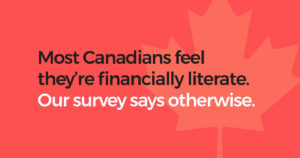 Want to give the gift of financial literacy to a loved one this Christmas?
Want to give the gift of financial literacy to a loved one this Christmas?
We have a few stocking stuffer ideas, following the just-completed Financial Literacy Month in Canada. Throughout November, there were lots of articles out there on the importance of financial literacy and even more opinions about how to improve it.
Some argue for it to be taught in schools: aren’t our schools stretched enough for resources as it is? Some say parents should make it a priority to teach their children about money but many parents struggle with money concepts themselves and “do as I say, not as I do” isn’t always convincing. Many argue very credibly that the financial services industry in Canada generally works to separate people from their money rather than to educate them about how to best grow their money.
We’re not sure what the answer is but agree it’s an important subject. If you’ve already read David Chilton’s The Wealthy Barber and are ready to move on to the next step, here are a few investment books that are sensible and concise.
*We first published this list in February 2015 and have received positive feedback!
1) The Investment Answer – Daniel Goldie and Gordon S. Murray – 2011
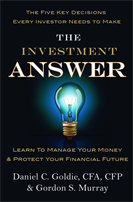
Publisher summary:
“What if there were a way to cut through all the financial mumbo-jumbo? Wouldn’t it be great if someone could really explain to us–in plain and simple English–the basics we must know about investing in order to insure our financial freedom? At last, here’s good news. Jargon-free and written for all investors–experienced, beginner, and everyone in between–The Investment Answer distills the process into just five decisions–five straightforward choices that can lead to safe and sound ways to manage your money.”
2) The Little Book of Common Sense Investing: The Only Way to Guarantee Your Fair Share of Stock Market Returns – John C. Bogle – 2007
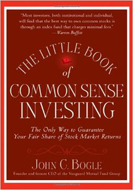
Publisher summary:
“Investing is all about common sense. Owning a diversified portfolio of stocks and holding it for the long term is a winner’s game. Trying to beat the stock market is theoretically a zero-sum game (for every winner, there must be a loser), but after the substantial costs of investing are deducted, it becomes a loser’s game. Common sense tells us-and history confirms-that the simplest and most efficient investment strategy is to buy and hold all of the nation’s publicly held businesses at very low cost. The classic index fund that owns this market portfolio is the only investment that guarantees you with your fair share of stock market returns. To learn how to make index investing work for you, there’s no better mentor than legendary mutual fund industry veteran John C. Bogle.”
3) The Empowered Investor: A Canadian Guide to Building a Better Investment Experience – Keith Matthews – 2013
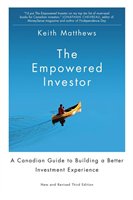
Publisher summary:
“With The Empowered Investor: A Canadian Guide to Building a Better Investment Experience, author and advisor Keith Matthews answers the call for a clear, intelligent guide for Canadians looking to invest wisely. Dispensing with jargon and hype, The Empowered Investor is an easy-to-read finance and portfolio management book that offers a down-to-earth treatment of a complex subject with an accessible style that will appeal to novices and experts alike.”
4) Exchange Traded Funds for Canadians for Dummies – Russell Wild and Bryan Borzykowski – 2013
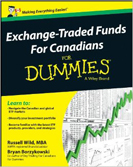
Publisher summary:
“The fast and easy way for Canadians to understand and invest in ETFs – Exchange-traded funds (ETFs) are an increasingly popular part of the investing landscape, being less volatile than individual stocks, cheaper than most mutual funds, and subject to minimal taxation. But how do you use this financial product to diversify your investments in today’s ever-changing market?
Exchange-Traded Funds For Canadians For Dummies shows you in plain English how to weigh your options and pick the ETF that’s right for you. It tells Canadian investors everything you need to know about building a lean, mean portfolio and optimizing your profits. Plus, the book covers all of the newest ETF products, providers, and strategies, as well as Commodity ETFs, Style ETFs, Country ETFs, and Inverse ETFs. The only book on the market catering specifically to Canadian investors.”
5 more suggestions
Editor’s Note: For a list of 5 more financial book suggestions, read this article from Saturday’s Financial Post: Here’s a look back at some of the best personal finance and economics books of 2016.


